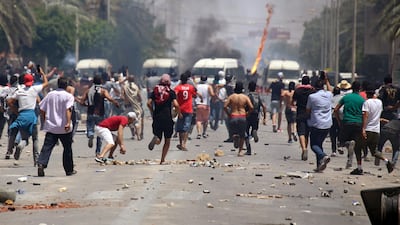Protesters demanding jobs and the release of an activist in Tunisia's marginalised south clashed on Monday with security forces for a second day in a row after weeks of tensions.
Police fired tear gas to disperse hundreds of demonstrators who threw stones and burned tyres in the centre of Tataouine city.
Defence ministry spokesman Mohamed Zekri said the army was on guard outside state establishments.
Protesters demanded authorities make good on a 2017 promise to provide jobs in the gas and oil sector to thousands of unemployed.
For weeks, protesters blocked roads and tried to prevent trucks from delivering supplies to the remote El Kamour pumping station, and their efforts were largely peaceful.
"The government has no intention of keeping its promises. It wants to trample us," said Khalifa Bouhaouech, who is involved with the El Kamour sit-in.
On Sunday, demonstrators in Tataouine city burned tyres and pelted security forces with stones to demand jobs and the release of activist Tarek Haddad, who was arrested the night before, as security forces responded with tear gas.
Mr Haddad is a key figure in the protest movement.
The governor of Tataouine, Adel Werghi, said Mr Haddad was "wanted" by the authorities, without providing further details.
Protesters denounced Mr Haddad's arrest as "political".
The interior ministry said 10 people were arrested on Sunday after a group of protesters tried to attack police stations with Molotov cocktails.
"The protesters' demands are legitimate... as long as they do not obstruct state institutions," Employment Minister Fethi Belhaj said in a radio interview.
The government was committed to respecting the 2017 agreements, he said.
In 2017, protesters blockaded El-Kamour for three months, demanding jobs.
The sit-in ended after the then employment minister signed a deal with representatives of the protesters, brokered by the UGTT trade union body, pledging to invest 80 million Tunisian dinars a year (almost $28 million) in Tataouine.
The UGTT branch in Tataouine said the promise was never kept.
President Kais Saied, who was in France on Monday, met with campaigners from the southern region earlier this year.
The UGTT had called for a general strike on Monday in Tataouine, denouncing an "excessive and unjustified" use of force against protesters.
Shops were open but public services and state institutions were closed by strikers.
The protests came as Tunisia, until now largely spared the worst of the novel coronavirus, faced tensions within its coalition government and the impact of restrictions imposed to combat the spread of the pandemic that have accentuated inequalities.
Almost 10 years after the country's revolution, Tataouine – where most of Tunisia's slim hydrocarbon resources are located – is still underdeveloped, NGO Oxfam said in a new report.
The region was the worst-hit in the country for unemployment, at 28.7 per cent, it said, and there were no intensive care beds per 10,000 people, compared to 10.2 in the capital, Tunis.

